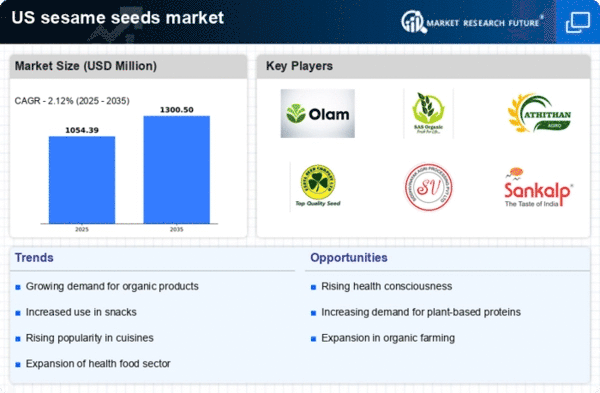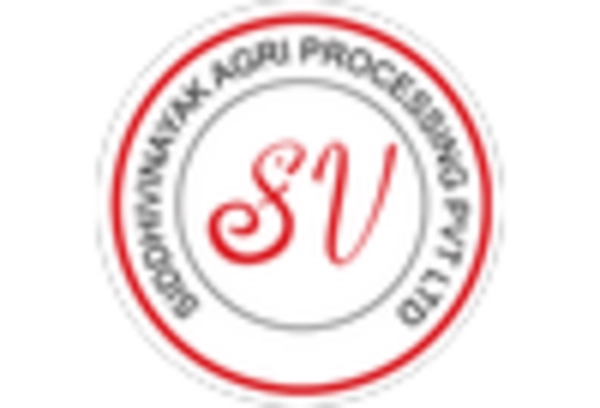Expansion of Snack Food Market
The sesame seeds market is poised for growth due to the expansion of the snack food market. As consumers increasingly seek convenient and healthy snack options, sesame seeds are being incorporated into a variety of snack products, including bars, crackers, and trail mixes. The US snack food market is projected to reach $100 billion by 2025, with a significant portion of this growth attributed to healthier snack alternatives. Sesame seeds, known for their nutritional profile and crunch, are well-positioned to capitalize on this trend. The versatility of sesame seeds allows manufacturers to create innovative snack products that cater to health-conscious consumers, thereby enhancing their presence in the sesame seeds market.
Rising Popularity of Ethnic Cuisines
The sesame seeds market is benefiting from the rising popularity of ethnic cuisines, particularly those from Asian and Middle Eastern cultures. As consumers become more adventurous in their culinary choices, the incorporation of sesame seeds into various dishes has gained traction. This trend is evident in the increasing use of sesame oil, tahini, and sesame-based snacks in American households. Market Research Future suggests that the ethnic food market in the US is expected to grow at a CAGR of 10% over the next five years, which could further bolster the demand for sesame seeds. The versatility of sesame seeds in enhancing flavor and texture in diverse recipes positions them favorably within the sesame seeds market, appealing to a broad range of consumers.
Growing Awareness of Nutritional Benefits
The sesame seeds market is witnessing a heightened awareness of the nutritional benefits associated with sesame seeds. Rich in healthy fats, vitamins, and minerals, sesame seeds are increasingly recognized for their potential health benefits, including heart health and anti-inflammatory properties. As consumers become more informed about nutrition, they are actively seeking foods that contribute to overall well-being. Recent surveys indicate that approximately 60% of consumers in the US prioritize health benefits when selecting food products. This growing awareness is likely to drive increased consumption of sesame seeds, as they are perceived as a superfood. Consequently, the sesame seeds market stands to gain from this trend, as health-conscious consumers incorporate sesame seeds into their diets.
Increased Demand for Plant-Based Proteins
The sesame seeds market is experiencing a notable surge in demand for plant-based proteins, driven by a growing consumer preference for healthier dietary options. As more individuals adopt vegetarian and vegan lifestyles, the need for alternative protein sources has intensified. Sesame seeds, rich in essential amino acids, are increasingly recognized as a valuable addition to plant-based diets. Recent data indicates that the market for plant-based proteins in the US is projected to reach approximately $10 billion by 2025, highlighting the potential for sesame seeds to capture a significant share of this expanding market. This trend not only reflects changing consumer preferences but also underscores the importance of sesame seeds in meeting nutritional needs, thereby enhancing their appeal within the sesame seeds market.
Innovations in Food Processing Techniques
The sesame seeds market is experiencing a transformation due to innovations in food processing techniques. Advances in technology have enabled the development of new products that utilize sesame seeds in unique ways, such as sesame-based spreads and fortified foods. These innovations not only enhance the appeal of sesame seeds but also expand their applications in various food categories. The food processing industry in the US is expected to grow at a CAGR of 5% over the next five years, indicating a favorable environment for sesame seed products. As manufacturers explore novel ways to incorporate sesame seeds into their offerings, the sesame seeds market is likely to benefit from increased product diversity and consumer interest.
















